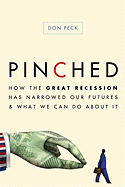
Economic downturns negatively affect every generation that faces them, and the recession of 2008 was no different, but the losses often go much deeper than one might realize. In Pinched, Don Peck, an Atlantic journalist, details the enormous social, emotional and personal costs of the current recession.
Peck doesn't try to pretend that the economic costs of recession are minimal; they are, as he points out, staggering. But the costs of economic downturn go beyond dollars and cents--they include the loss of valuable career opportunities for those just graduating from college and the loss of manufacturing and other blue-collar jobs for those who never attended. They include enormous costs in self-confidence and self-esteem, as millions of Americans suddenly find themselves without employment and thus, for many, without a meaningful use to which to put their time.
The losses of significant work and the permanent damage to careers are common fallout in any recession; however, Peck says, this recession differs in at least two ways. One is the losses inflicted by the housing bubble, which is easily the largest economic bubble to ravage the economy in U.S. history. The other is the political chasm opening between the haves, who have been largely unmolested by the recession, and the have-nots, who were sold an American Dream based on home ownership and consumption and who are now seeing everything promised evaporate.
Pinched paints a bleak picture of the this Great Recession because, in many ways, the picture is bleak. By bolstering the middle class and providing jobs, however, Peck suggests that we can turn the bleakness around, even if it takes years. --Dani Alexis Ryskamp, blogger at The Literary Cricket

